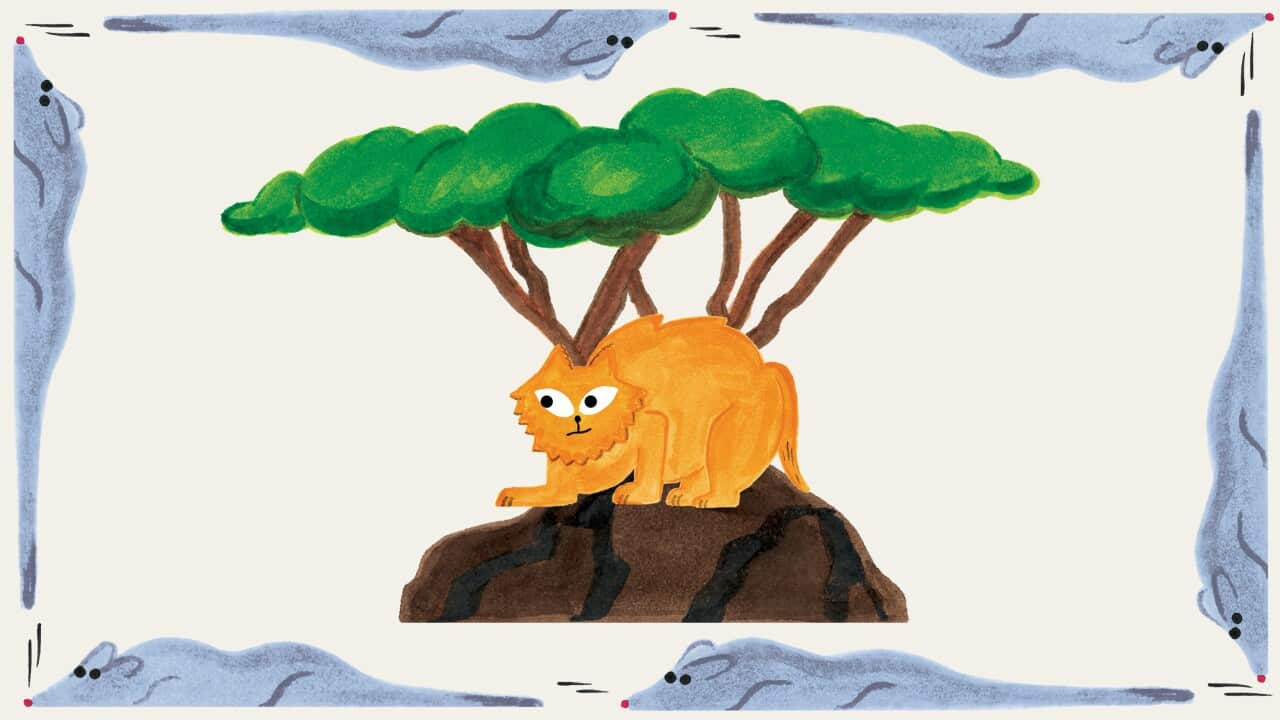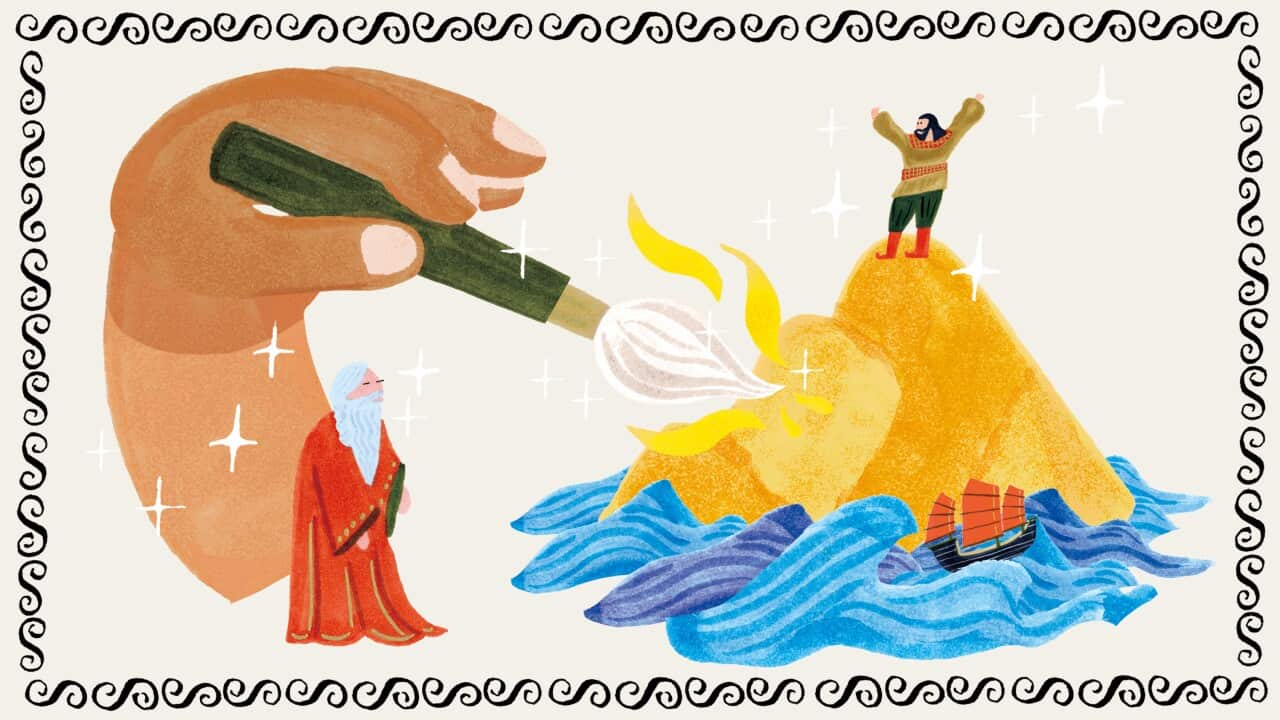This story comes to us from the Amharinya language of Eastern Africa.
It’s bursting with brilliant schemes and colourful characters... including some you might recognise from your own house!
Host and narrator: Alice Qin
Story consultant and translation: Martha Menda
Story editor: Marcel Dorney
Voices: Martha Menda, Ala'a al-Tamimi, Hana Yassin
Recording engineer: Vlad Ladgman
Executive producer, sound design and music: Kieran Ruffles
TRANSCRIPT
This story is about a wedding. A very large wedding, in which dozens would be married. This was the wedding of the Cats and the Rats.
This story takes place in a small town called Merhabete. Then, as now, most people in Merhabete were farmers; they grew corn, sugarcane, and sorghum, as well as many different fruits and vegetables. Like many towns, their summers are hot and their winters are cold. Like many farmers, they depended mostly upon the rain for their water. If it doesn’t rain, everyone suffers - the river, the farmers, their cattle, and the other animals, including the Cats and the Rats.
If you know cats or rats, you’ll know both animals think of themselves as very clever. Then, as now, the Rats were small, numerous and cunning, so much so that the only animals quick and decisive enough to catch them… were the Cats.
Because of this, all the farmers of Merhabete kept Cats to protect their harvests from the Rats, feeding them on scraps of meat. (The Cats agreed they liked the lungs best.)
Sometimes the winter is dry; sometimes the summer brings little rain. But this year, there had been hardly any rainfall in Merhabete, in either winter or in summer. And food became more and more scarce. Farmers would not slaughter cattle, fearing their herds could not be replaced. And more than most animals, Cats need meat - so there was hardly any food for them, and they grew skinny and skittish.
Among the Cats was one known as Mr Mandefro. Mandefro means ‘no one can beat me’. The Cats thought of Mr Mandefro as their leader, and he and his wife, Mrs Hudad, had seen many seasons come and go.
‘This is the worst drought I’ve ever seen’, Mrs Hudad said to her husband one evening as they walked by the river. Her name meant ‘source of the river’, and she was upset to see the river’s water run so low.
‘I’m thinking of a plan, my dear,’ said Mr Mandefro. ‘But for the plan to work, we must first convince the Rats that our great rivalry is over.’
He then explained his plan to his wife. Mrs Hudad listened until he was finished, then thought for a good while.
‘I love you,’ she said, ‘and I trust you, but this sounds very difficult indeed. Nevertheless, I think we should ask our people.’
The next day, Mr Mandefro took his place on the big black stone, next to the giant Acacia Tree. Around him were his wife and their six children; and all around them were the many Cats of Merhabete, each one anxious to hear why their leader had called this emergency meeting. Once everyone had stopped meowing (and if you know cats, you know that took some time) Mr Mandefro began to speak.
‘As you know,’ he said, ‘food is scarce, and our employers, the human beings, have no solutions. I believe I have one… but first, I would like to hear your thoughts.'
An elderly Cat to the right side of the black stone raised his paw.
'Go ahead, Mr Kurabachew,' said Mandefro.
Mr Kurabachew was a very old Cat, skinny as a wire. 'I have never seen or heard of such a food shortage,’ he said, ‘not in my life, and not in my father’s nor my grandfather’s. Whatever we do, it’ll have to be something very clever. I’m putting my faith in you, young Mandefro.'
A beautiful ginger Cat spoke up. 'What if we send our children to another village, to see if there is any food there…?'
'But what if there’s a drought there too?' scoffed a young black Cat. 'What if those cats come to attack us? Or those dogs…?'
Mr Mandefro listened to the ideas as they went back and forth. Finally he stood on his hind legs and waved his paws for attention.
'Thank you,’ he said, ‘thank you all. But my idea is a little different. It involves a wedding. A very large wedding.
'We, the Cats of Merhabete, must agree to marry our sons… to the daughters of the Rats.'
All the Cats started to murmur. Marriage? Between Cats and Rats? Surely that’s impossible.
'I know, I know,' said Mr Mandefro, 'it is a bit weird. But it can work, if we are all committed to it. Young Cats, we will need your speed. Elderly Cats, we will need your wisdom. We must convince the Rats of our sincerity, before we hunt them one last time…'
By the end of the meeting, most of the Cat families had happily agreed to their leader’s conspiracy.
Three of the elder Cats - one black, one white, one ginger - were chosen as messengers to visit the Rats.
II
The next day those elderly Cats went to the Rats community with gifts of sorghum and corn seeds.
Mr Tertaraw was the leader of the Rats. Now, his name means ‘watchful one’, and he was suspicious immediately.
However, he remained polite.
‘Thank you for the gift,’ he told the Cats. ‘You must have suffered during this drought, also. What brings you here, exactly…?’
The three Cats explained, in great earnest, their plan to wed their sons to the daughters of the Rats.
Mr Tertaraw was very sceptical indeed. However, he let the Cats finish, and then, for some time, they bargained, as any two families might, about the many exchanges and obligations that go into planning a wedding. Back and forth they went, until finally, the Cats and Rats were in agreement, at least as much as any two families can be when their children are to be married.
The three Cats went back to tell Mr Mandefro, who swished his tail in satisfaction, and called his clan together once more.
'On this great wedding day,' he told the assembled Cats, ‘many dozens of rats will attend. Tradition tells us that the groom and their family - that’s us - travel to the house of the bride’s family for the wedding. So each Cat that attends - that’s all of you young fellows, and your families - each of you must grab at least two rats to bring home for supper. Two each. Do you hear me? Two each!'
Meanwhile, the young girl Rats had heard about the wedding, and immediately began their preparations to marry the handsome Cats, talking excitedly about how pretty they would look on their wedding day. Hearing this, some of the young boys among the Rats became very jealous that the girl Rats will be marrying such handsome creatures.
While they quarrelled, Mr Tertaraw had called a meeting of all the Rat parents whose children were to be married to the Cats.
'Think about it,' said one Rat father with many daughters. 'If all our daughters marry Cat boys, the Cats can’t kill or eat us anymore. They just cannot! We’d be family! You don’t eat family!’
'Well, no, you do not,' said Mr Tertaraw 'And that does sound nice, if it were true… But what if it is not? We know the Cats are almost as clever as us. We should, at least, have a plan.’
Mr Tertaraw did have a plan, and he explained it carefully to his people. ‘We must dig a secret hideout under the village,’ he told them, ‘and leading to the hideout, we must dig tunnels up towards the surface: many tunnels, spreading out widely. And we must make these tunnels very carefully… narrow at the top, so the Cats cannot follow us down.'
The Rats agreed to do as he said. 'Remember, we can’t let them know that we suspect. We must all be watchful.'
III
Both sides toiled to finish their preparations as the big day drew near.
Finally, on a Saturday afternoon, the handsome young boy Cats, along with their friends and families, made their way excitedly to the house of their new brides-to-be.
The Rat brides and their families were there to greet them by clapping, chanting and singing this song, which is traditional at weddings in Merhabete -
Anasgeban Sergena
Edge Yetegna
Anasgeban Berun
Serge Nawene
In response, the Cats began to sing this song, which was also well-known to everyone -
Hayloga Hayloga Shibo
Hay Hay Hayloga Ho
While everyone was happy singing and dancing, the Cat family started to sing a new song: a song no-one had heard before, and certainly not one that is traditional at weddings!
Miaw Miaw Dar Darun Kebebewe!
Miaw Miaw Dar Darun Kebebewe!
And then the Cats started to spread out and surround the Rats to put them on their circle.
However, the Rats were as watchful as Terteraw had told them to be, and they began to sing their secret song, as a signal to their brothers and sisters -
Egnam awkenal
gudguad mesena...
So singing, the Rats spread out even faster than the Cats, until they surrounded them. The Cats were not expecting this at all, and first one Cat, then more and more, broke out from their circle, and began to chase the Rats desperately.
But the clever and well-prepared Rats ran away to their holes. Even as they jumped in, the Cats tried leaping after them, but over and over they missed, and were left scrabbling foolishly at the holes the Rats had prepared so carefully.
In the underground meeting place, the Rats looked around and counted. Was anyone missing? Had they lost their mothers and fathers? Their friends and siblings?
But the Cats had not caught one single Rat. And they shambled back to their community, heads hanging in shame at having failed. But their embarrassment, surely, was shared by their leader, who, after all, had entered a contest of cleverness with the Rats... and had come second.
That’s the end of the story - and in accordance with tradition, we shall finish by saying
Tereten Melesu
Afen Bedabo Absu


